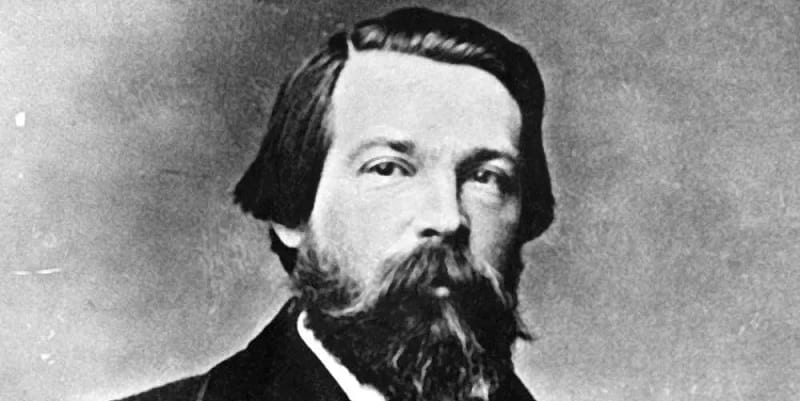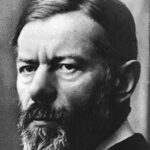Friedrich Engels biography and quotes

Friedrich Engels (1820 – 1895) was a German economist, philosopher, historian and socialist. He was also a businessman, journalist and political activist. His father owned the large textile mills in the United Kingdom, and former Prussia, now Germany. Friedrich Engels is best known for his theory of Marxism, which he developed together with Karl Marx.
In 1845 Friedrich published the book ‘The Condition of the Working Class in England’. He based this book on personal observations and researches in various English cities. Friedrich is also the co-author of ‘The Communist Manifesto’, with Karl Marx. He supported Karl Marx financially, which allowed him to write ‘Das Kapital’. After Marx’s death, he published the fourth volume of ‘Das Kapital’. This article covers his biography, quotes and publications.
The biography of Friedrich Engels
Early Years
Friedrich Engels was born on November 28, 1820 in Barmen, province of the Kingdom of Prussia, present-day province of North Rhine-Westphalia, Germany. He is the eldest son of a German textile manufacturer with whom he had a difficult relationship.
He dropped out of high school early and in 1838 became an office clerk at a trading office in Bremen. Friedrich began to acquire business experience, pressured by his father, but at the same time he gained interest in poetry, languages, philosophy and journalism.
During this time his interest in Hegel’s philosophy was awakened. Hegel dominated German philosophy at the time. In 1838, Engels published his first work, a poem named ‘The Bedouin’. He began to lead a somewhat double life, as a businessman by day and a radical at night.
In 1841, Engels joined the Prussian army, with the Household Artillery. It was during this time that he came into contact with groups of Hegel’s followers.
He published anonymous articles in the ‘Neue Rheinische Zeitung’, in which he mainly exposed the poor working and living conditions of factory workers. The editor of that magazine was Karl Marx. Engels repeated several times in his life that he was indebted to German philosophy because of its influence on his intellectual development.
Formative Years Engels
In 1842 Engels was sent to Manchester, England, to work in the offices of entrepreneurs Ermen and Engels’s Victoria Mill where sewing threads were produced. His father did this in the hope that Friedrich would reconsider his radical views.
In Manchester Friedrich met Mary Burns. She was a fierce young Irish woman with radical views somewhat like those of Friedrich. They got into a relationship but never got married because of their views on marriage. During his time in England, Friedrich also studied the greatest economic writers, including Adam Smith, Robert Owen, Charles Fourier, and Pierre Joseph Proudhon.
On his way back to Germany, Friedrich met Karl Marx for the second time in Paris. There, a lifelong intellectual understanding was formed, when they discovered that they had the same opinion about almost everything. From then on, the two began collaborating on their writing.
Karl Marx had read Engels’s articles about the class bearing the disadvantages of the social order without enjoying its advantages. Marx took Engels’ idea that the working class would lead a revolt against the bourgeoisie and adopted it as part of his own philosophy.
Friedrich Engels decided to stay in Paris to help Marx write ‘The Holy Family’, an attack on the Young Hegelians. In 1845 Friedrich published ‘The Condition of the Working Class in England’. Next, he joined Karl Marx, this time on the mainland in Brussels. He worked closely with Marx over the following years to build the intellectual and political foundations of their movement.
Together Karl Marx and Engels wrote ‘The Holy Family’, ‘The German Ideology’ and ‘The Communist Manifesto’ (originally ‘The Manifesto of the Communist Party’). They joined forces to encourage various working-class groups to enter politics and criticised German socialists who rejected the need for a revolution.
When hopes for a revolution disappeared in the early 1940s, they moved to England. Engels resumed his work at the family business, while Karl Marx went to live and work in London. He supported Karl Marx with money and also pursued his own ideas. He became Karl Marx’s most successful popularizer and propagandist.
Engels’ Later Years
In later years, Karl Marx and Engels held a view that workers in some countries might be able to achieve their goals through peaceful means. While still staying committed to social revolution, Engels also allowed room for a more peaceful, democratic road to socialism, explaining that socialists were evolutionists.
Therefore, confusion arose, as the public perception of Engels now became one of him leaning more towards evolutionary socialism and a gradualist stance. He had stated that a revolution would have been suicidal, since historical circumstances did not favor a revolutionary seizure of power, but a parliamentary road to power instead.
This, however, was a tactical response to the times and he was still very much committed to revolutionary socialism. He was therefore not amused when later his introduction to Marx’s ‘The Class Struggles in France’ was edited by Eduard Bernstein, a Marxist revisionist, and Karl Kautsky, an orthodox Marxist.
In this new edition Friedrich came across as an advocate of a peaceful road to socialism. So, in April 1895, shortly before his death, he responded to Kautsky:
“I was amazed to see today in the Vorwärts an excerpt from my ‘Introduction’ that had been printed without my knowledge and tricked out in such a way as to present me as a peace-loving proponent of legality [at all costs]. Which is all the more reason why I should like it to appear in its entirety in the Neue Zeit in order that this disgraceful impression may be erased. I shall leave Liebknecht in no doubt as to what I think about it and the same applies to those who, irrespective of who they may be, gave him this opportunity of perverting my views and, what’s more, without so much as a word to me about it.”
After Karl Marx‘s death in 1883, Friedrich Engels was the main authority on Karl Marx and Marxism. He completed parts 2 and 3 of ‘Das Kapital’. He completed the works based merely of Marx‘s notes and incomplete manuscripts.
Even in later life he still defended the need for social democratic reforms, despite the progress of European parliamentary democracy.
Friedrich Engels died of cancer in London in 1895.
Famous quotes by Friedrich Engels
- “An ounce of action is worth a ton of theory.”
- “If there were no Frenchwomen, life wouldn’t be worth living.”
- “The emancipation of woman will only be possible when woman can take part in production on a large, social scale, and domestic work no longer claims anything but an insignificant amount of her time.”
- “The middle classes have a truly extraordinary conception of society. They really believe that human beings . . . have real existence only if they make money or help to make it.”
- “The free development of each is the condition for the free development of all.”
- “All that is real in human history becomes irrational in the process of time.”
- “Do you charge us with wanting to stop the exploitation of children by their parents? To this crime we plead guilty.”
- “A change in Quantity also entails a change in Quality”
- “What each individual wills is obstructed by everyone else, and what emerges is something that no one willed.”
- “The history of all hitherto existing societies is the history of class struggles.”
- “In this sense, the theory of the Communists may be summed up in the single sentence: Abolition of private property.”
- “The state is nothing but an instrument of oppression of one.“
Books and Publications by Friedrich Engels
- 1908. Introduction, Socialism: Utopian and Scientific. Chicago: Charles H. Kerr Publishing Co.
- 1884. The Origin of the Family, Private Property and the State. (Original (German: Der Ursprung der Familie, des Privateigenthums und des Staats).
- 1883. Dialectics of Nature. (Original German: Dialektik der Natur).
- 1880. Socialism: Utopian and Scientific.
- 1878. Herr Eugen Dühring’s Revolution in Science.
- 1850. The Peasant War in Germany.
- 1845. The Condition of the Working Class in England.
- 1844. The Holy Family.
- 1838. The Bedouin.
How to cite this article:
Janse, B. (2021). Friedrich Engels. Retrieved [insert date] from Toolshero: https://www.toolshero.com/toolsheroes/friedrich-engels/
Published on: 08/30/2021 | Last update: 08/03/2023
Add a link to this page on your website:
<a href=”https://www.toolshero.com/toolsheroes/friedrich-engels/”>Toolshero: Friedrich Engels</a>











